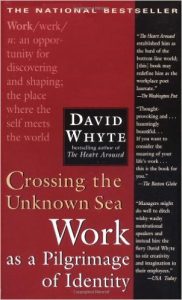I love the poetry of David Whyte. If you don’t know, he’s a Northwest poet, and one that specifically targets the squishy area of being in the business world. Poetry aimed to address and frame work, career, family life, and the mess that all adds up to.
In his excellent book, Crossing the Unknown Sea, David has an excellent passage about returning home after a long day of work. Many of us have been on one side of this or the other. Either the money earner role, waiting for solace, or the homekeeper waiting for an adult to talk to. Its challenging to make this transition, regardless of which side. We pick up the topic on page 214.
For single folks, coming home can be great, and not so great:
“Like the monk returning to the shelter of a narrow cell we find the actual spaciousness of a palace. Blissfully single, we turn on our favorite music,, at precisely the volume we please, make tea, lie horizontal on the couch an look around our little private kingdom. [However] in periods of unhappiness we return to the bleak shadow of loneliness, desperate for someone to simply ask us about our day, for the chance to exchange and receive sympathy. “
Families of course have their challenges:
“Coming home to our families presents its own possibles and prohibitions…we forget the privilege of marriage or cohabitation when we walk through the door with our own tiredness and are presented immediately with their own competing tiredness. It is exhausting to be exhausted and then to be presented with someone else’s exhaustion. We had hoped for respite and sympathy and find ourselves having to call on reserves we don not feel we possess.”
But what is this exhaustion telling us? If its extreme, Whyte tells us it could be indicating that something is off-kilter:
“The tragedy of our over-commitment to work is often marked and made clear to us in these hours …. Obsessive commitment to our work, whatever fictions we tell ourselves in the office, sacrifices the timelessness of our children, the romanced of our marriage, and the necessary ability to enter the sweet territory of our own solitude.”
What can we do about the moving into the threshold of our home the right way? How can we make sure we don’t engage in “exhaustion competition”, to see who had the worse day, with our significant other? He gives us a clue in the following passage:
“The voice and the identity we occupy on the threshold of our homecoming tells us whether our human pilgrimage through life is being emboldened or completely overwhelmed by our careers.”
Voice and identity. During my graduate program at Seattle University, I was taught to pay attention to my voice. To my identity. To focus on those things that could slip by if you’re not aware of them. To engage, as much as you can, your intention. So its not that we can change our voice and identity before we enter our homes as if we could slip off our skin. It is more about paying attention to what we’re carrying in with us and dumping on those behind the door of our home, be it a dog, a family, a roommate, or the worst critic of all, ourselves.
A terrific Wednesday Wisdom Action is found in Whyte’s suggestion to create “something timeless” for our homeward return. This would provide everyone a chance to find grounding, and establish the right voice and identity if it isn’t present. He suggests a ritual team time for adults and children; a glass of wine, or a cup of coffee, for the tired couple; a time for everyone to say how it went, or didn’t. One ritual I have, to enter the threshold to those I love with intention is to occasionally wait in the car until I’m ready to be present.
What rituals do you practice before you pass the threshold from work to home? Or how do you greet those who are coming home?
